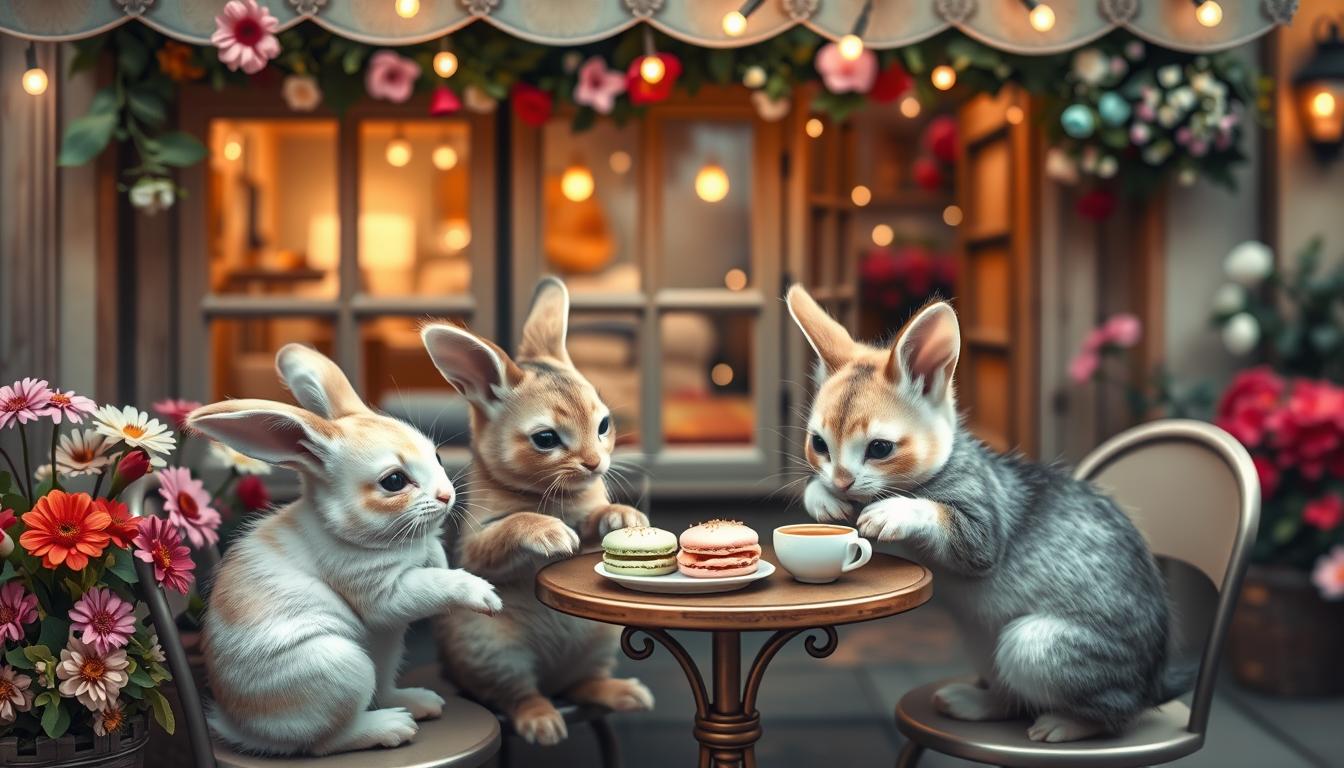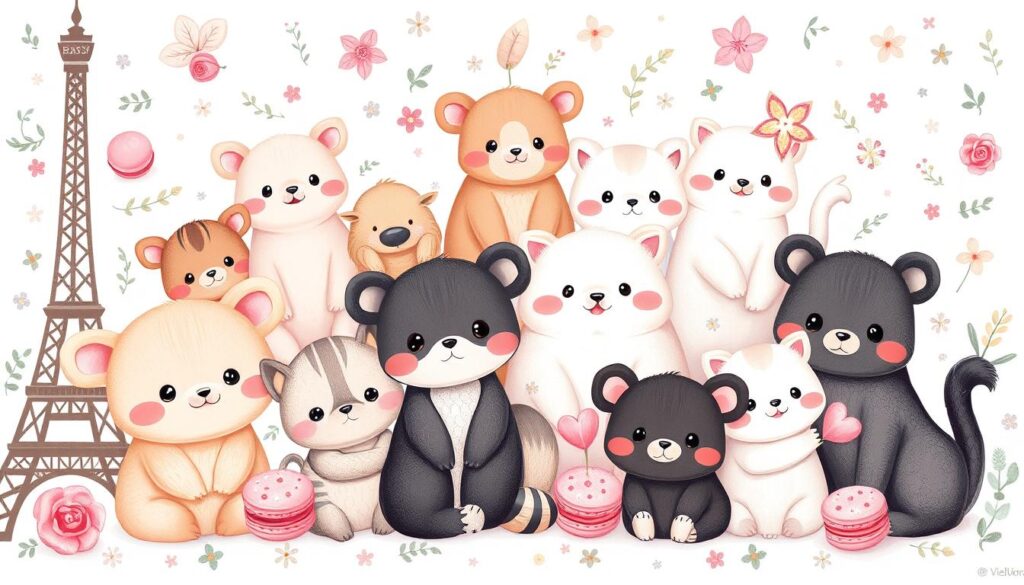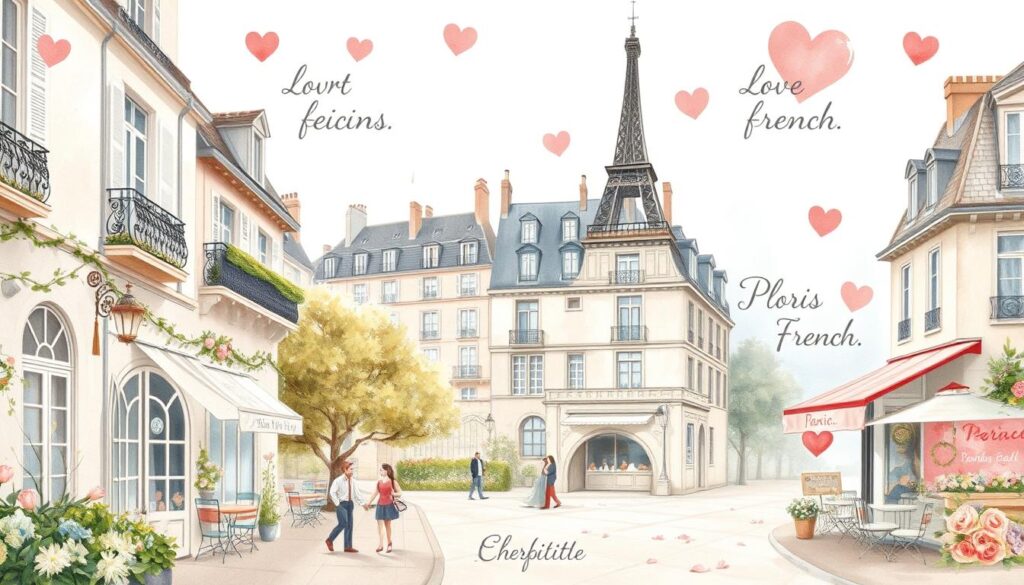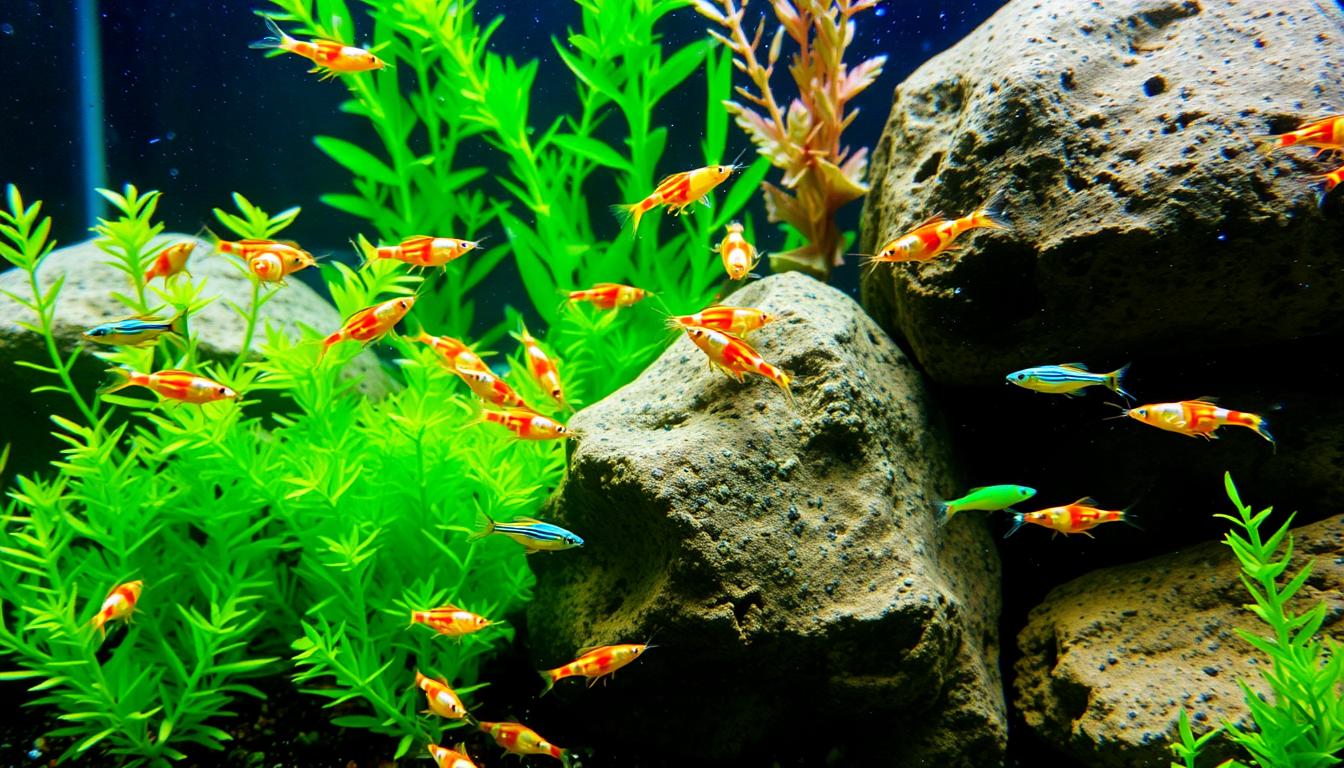Discover How to Say Cute in French & Express Adorable

Did you know French is one of the most romantic languages? It has a big vocabulary for showing love and charm. Learning to say “cute in French” opens a world of *adorable en français* words. These *charming French words* will not only grow your vocabulary but also let you dive into the culture of this beautiful language.
Starting this journey, you’ll find at least 10 ways to say cute in different situations. Words like *mignon* and *mignonne* show how French adapts to everyday talk1. If you want to show tenderness or playfulness, knowing these differences is key. You’ll also see that these words carry deeper meanings, touching emotions and connecting people deeply.
Key Takeaways
- The French language offers multiple words to say cute, including *mignon* for masculine and *mignonne* for feminine contexts.
- Understanding cultural nuances is crucial for effective communication when discussing affection.
- Expressions like *mon amour* and *mon chéri* add depth and romance to relationships.
- Context matters significantly when using cute French words to ensure appropriateness.
- Repetition in vocabulary lends a playful charm to expressions of endearment in French.
The Charm of the French Language
The French language has a unique charm with its smooth sound and beautiful tones. It not only changes how we talk but also how we share our feelings. The magic of French translations is undeniable. They bring a depth of emotion that English often can’t match.
French is known as one of the most romantic languages in the world. Each word paints a picture of emotion, adding nuance and subtlety. Its rich vocabulary makes it perfect for showing love and care. This is seen in the many loving terms used in everyday talk, strengthening bonds between people.
| Compliments in French | Meaning in English |
|---|---|
| Adorable | Adorable |
| Ravissant(e) | Delightful (primarily for women) |
| Aimable | Kind (formal and old-fashioned) |
| Un crack | A real expert (colloquial) |
| Remarquable | Remarkable (suitable for all contexts) |
| Doué | Gifted |
| Raffiné | Refined |
| Le sang de la veine | Blood of the vein (informal, popularized by rappers) |
These aspects of French make it a language worth learning. By mastering these expressions, you connect deeper with the culture and people. Learning French opens a world of enchanting translations, making every conversation special2.
Understanding the Word ‘Cute’ in French
The French word for ‘cute’ is mignon for boys and mignonne for girls. These words show love and charm in many ways. They go beyond looks, showing appreciation for sweet traits or actions.
Studies show that mignon/-onne is used a lot in talking. Words like ‘craquant’ also mean cute, especially for food or animals3. This shows how French uses words in different ways.
In French, about 30% of endearment words are for pets and kids. Many French words don’t have direct English translations but are full of charm4. The word mignon is loved in talks, books, and movies, showing its importance.
These words let you show love in many ways, not just looks. French is rich in exploring what it means to be cute. Learning these words makes you appreciate language more.
| Word | Gender | Context of Use |
|---|---|---|
| Mignon | Masculine | Used for boys, pets, and food |
| Mignonne | Feminine | Used for girls and feminine nouns |
| Craquant | Neutral | Describes objects, actions, or attributes |
Knowing these differences helps you say ‘cute’ in French better. It makes your connection with the language stronger.
How to Say ‘Cute in French’
In the world of French, saying ‘cute’ is special. The words mignon for boys and mignonne for girls are key. They help us show how adorable something is, adding charm to our words.
Introduction to Mignon and Mignonne
Mignon means something is cute, often for boys, animals, or things. On the other hand, mignonne is for girls and women. Knowing when to use each is crucial for speaking French well.
Usage in Different Contexts
Mignon and mignonne are used to show love in many ways. For instance, “Le bébé est mignon” means “The baby is cute.” “Elle est mignonne” means “She is cute.” These words let us express feelings about pets, people, or things.
The French language also has mimi, charmant, and adorable for ‘cute’. These words help us show different levels of cuteness1. This variety lets us share a wide range of feelings, from ‘cute and sweet’ to ‘attractively cute’1.
Learning these words makes us appreciate French culture more. It makes talking and listening more fun5.
Alternate Expressions for ‘Cute’
Exploring cute expressions in French opens a world of charming French words. These words can make your vocabulary richer and your communication better. French has many ways to say ‘cute’ that show affection and admiration. Knowing these can make your talks more interesting and show your feelings clearly.
Exploring Complimentary Terms
Instead of just ‘mignon,’ try ‘adorable,’ ‘charmant/charmante,’ and ‘ravissant/ravissante.’ Each word not only means charm but also fits different feelings and situations:
| Term | Gender | Meaning | Example |
|---|---|---|---|
| Adorable | Both | Adorable or loveable | Elle est adorable avec ses lunettes. |
| Charmant | Masculine | Charming | Ce garçon est vraiment charmant. |
| Charmante | Feminine | Charming | Elle a un sourire charmant. |
| Ravissant | Masculine | Delightful or ravishing | Le paysage est ravissant aujourd’hui. |
| Ravissante | Feminine | Delightful or ravishing | Elle porte une robe ravissante. |
Variations in Expression: Charming vs. Cute
Knowing the differences between these pleasing terms in French can make your feelings clearer. For instance, ‘charmant’ and ‘charmante’ suggest elegance, while ‘adorable’ is softer and more loving. Using the right term can help you connect better with others and make your conversations richer. You can find more terms and their meanings in the fun world of French endearments here6
Sweet & Adorable: Saying ‘Sweet’ in French
The French language has many terms for showing love. Doux is for masculine objects, and douce is for feminine ones. Both mean “sweet” in English. Knowing how to use them can make your words more loving.
Meaning of Doux/Douce
Doux and douce mean something is sweet. They’re great for talking about someone gentle or a cozy moment. For instance, a fancy dessert might be called doux for its taste. Or, a child might be called mon doux, meaning “my sweet one.” This shows how deep these words can be in relationships.
Examples of Usage in Sentences
Here are some examples of using doux and douce in everyday talk:
| French Phrase | English Translation |
|---|---|
| Il est si doux. | He is so sweet. |
| Cette tarte est douce. | This pie is sweet. |
| Ma douce, viens ici. | My sweet, come here. |
| Vous êtes ma douce amie. | You are my sweet friend. |
| Elle a une voix douce. | She has a sweet voice. |
Using these words can make your talks more loving. This is good for both romantic and friendly relationships. For more on French terms of endearment, check out other resources to learn more.
The Versatility of ‘Mignon’

The French term mignon is loved for its many uses. It shows cuteness in different ways. Knowing when to use the male or female form helps you speak French better. It lets you show love or admiration in a special way.
Situational Usage
Mignon is great in many situations. Here are a few examples:
- Mignon for adorable pets—like fluffy kittens or playful puppies.
- Use mignonne for a charming woman or girl, showing her sweet side.
- Mignon is also good for cute things, like jewelry or art.
Masculine vs. Feminine Forms
Knowing the difference between mignon and mignonne is key. This is important because:
| Gender | Form | Usage Example |
|---|---|---|
| Masculine | mignon | C’est un chat mignon. |
| Feminine | mignonne | C’est une fille mignonne. |
Understanding these forms makes your French richer. It also makes you better at talking.
Switching between these forms makes your French better. It shows you know the nuances of mignon7. Using these terms well will impress people, showing you know French well.
Cultural Significance of Expressing Cuteness
Learning about cuteness in French can make you better at socializing. The French use many cultural expressions in French to show off cute things and moments. This makes people feel closer and more connected.
Importance in French Interaction
In French culture, cute phrases help make conversations warmer and more friendly. Saying “C’est trop mignon!” means something is very cute. It makes relationships stronger. This shows how much the French value beauty and charm in their daily lives.
Popular Phrases in Daily Conversations
People often say “mon petit chouchou,” which means “my little cabbage” and shows love. These words not only show cuteness but also caring feelings. They show a tradition of valuing emotions in language. It’s interesting to see how different languages, like German, French, and Italian, all have cute words89. For more on cute sayings, check this resource.
Additional Lovely French Phrases

French is known as the language of love. It’s full of phrases that make conversations warm and intimate. Learning these expressions can make your interactions unforgettable.
Expressions of Endearment
In French culture, using endearing words is key. Terms like chou, meaning “cabbage,” are used to show love. Phrases like “l’amour l’emporte,” or “love prevails,” capture the romantic essence of French10.
“Amour sans fin,” or “endless love,” shows the deep feelings you can share with a few words. These phrases not only show love but also make any relationship feel welcoming.
Charming Words and Their Nuances
The French language offers many ways to show affection. “Coeur fidèle” means “faithful heart,” showing loyalty in love. “Petit à petit, l’oiseau fait son nid” talks about building relationships with persistence.
These phrases help you express feelings more accurately11. Using apps like Lingvist can make learning more fun. It lets you find phrases that fit your style.Explore language learning resources that include romantic phrases to enhance your conversations.
cute in French: Expanding Your Vocabulary
Exploring the French language can greatly expand your vocabulary. It’s key to understand how to express cuteness effectively. You’ll find many terms that make your conversations more lively and expressive12.
There are many sweet names for babies in French. These names add charm to your talks12. They help show affection and introduce cultural expressions. Knowing these terms is especially useful when talking to young kids12.
Learning about baby items like milk and cribs also helps in everyday conversations12. French kids’ music, like lullabies, can help you remember words while having fun12.
Watching child-friendly French movies and reading bilingual books for kids can make learning fun12. Using beautiful French words like *douceur* or *rêvasser* can take your language skills to the next level13.
To remember your vocabulary, focus on French terms for days, months, and seasons. Knowing “Lundi” for Monday and “Janvier” for January shows you understand the culture14.
Fun Facts about French Words for ‘Cute’
French has a wide range of words for cuteness. It’s interesting to note that French doesn’t have the letter “w”. This makes it hard for French speakers to say English words like “Halloween” because of the silent “h”.
French slang adds a fun twist to saying “I love you.” For example, “casse-toi” means “get lost,” showing how language changes with culture15.
French nicknames are also fascinating. “Chéri” is for men, and “Chérie” is for women. These names show the language’s gender differences16. Names like “Mon chou” mean “my cabbage,” adding a playful touch16.
The French counting system gets complex at sixty. But it’s part of what makes French so interesting. You might enjoy learning slang like “bouffer” for eating a lot or “pote” for a friend17.
French is more than just words. It’s full of fun expressions and slang. Phrases like “mouir de rire” mean “to laugh so hard you almost die” show the language’s playful side15.
| Term | Meaning | Example |
|---|---|---|
| Chéri | Darling (male) | Mon chéri, tu es adorable. |
| Chérie | Darling (female) | Ma chérie, tu es incroyable. |
| Casse-toi | Piss off | Casse-toi, je ne veux pas de toi ici. |
| Bouffer | To eat (greedily) | J’ai faim, je vais bouffer quelque chose. |
| Pote | Buddy | Mon pote m’a aidé. |
Conclusion
Learning to say cute in French makes talking more fun and warm. Words like mignon and mignonne add a special touch to conversations. They carry deep cultural meanings that people love to use every day18.
About 90% of talks end with a final thought. Knowing how to end your sentences well is key. It shows you appreciate the beauty of French18.
Knowing different ways to say cute also makes your feelings clearer. This is crucial when talking to people who speak French as their first language. French often talks about love and romance, helping you connect with others on a deeper level19.
So, learning cute phrases in French is not just helpful. It’s essential for a full and rich language experience. It lets you dive into French culture and grow your vocabulary.
Using these phrases can make your conversations with friends or loved ones even better. It shows you care about feelings and understand the subtleties of language20.
FAQ
What is the most common word for ‘cute’ in French?
How can I use ‘mignon’ in a sentence?
Are there any synonyms for ‘cute’ in French?
What does ‘doux’ mean and how can it be used?
How do I choose between masculine and feminine forms of ‘mignon’?
Why is expressing cuteness important in French culture?
Can you give examples of endearing phrases in French?
How can expanding my vocabulary help me express cuteness more effectively?
What are some fun facts about the use of ‘cute’ in French?
Source Links
- https://justfrenchit.com/cute-in-french/ – Cute in French 🥰 10 ways to say cute in French – Just French It
- https://www.connexionfrance.com/magazine/try-these-compliments-in-french-to-charm-like-a-native/665914 – Try these compliments in French to charm like a native
- https://dictionary.cambridge.org/dictionary/english-french/cute – cute
- https://www.expatica.com/fr/education/language-learning/french-terms-of-endearment-909634/ – Romantic and obscure French terms of endearment
- https://www.babbel.com/en/magazine/favorite-french-words – How To Say Cute, and 8 Other French Words We Love
- https://www.ef.com/wwen/blog/language/romantic-french-phrases/ – 10 romantic French phrases to charm your crush ‹ EF GO Blog | EF Global Site (English)
- https://www.busuu.com/en/french/phrases – 100+ Common French Phrases for Everyday Situations – Busuu
- https://www.bbc.co.uk/bitesize/articles/zwts46f – What is it that makes a term sound endearing? Find out which word have the extra ‘awww’-factor and why. – BBC Bitesize
- https://pmc.ncbi.nlm.nih.gov/articles/PMC5102905/ – Aww: The Emotion of Perceiving Cuteness
- https://www.bryndonovan.com/2019/01/07/beautiful-french-phrases-for-tattoos-instagram-facebook-or-just-to-inspire-you/ – Beautiful French Quotes and Phrases
- https://lingvist.com/course/learn-french-online/resources/i-love-you-french/ – No title found
- https://www.talkinfrench.com/french-for-parents-101-baby-talk-vocabulary-lists-tips/ – French for Parents 101: Baby Talk, Vocabulary Lists (+ Tips!)
- https://langster.org/en/blog/15-most-beautiful-words-in-french/ – 15 Most Beautiful French Words to Memorize | Langster
- https://www.opeton.co/blog/essential-french-vocabulary-words-every-learner-should-know – 10 Essential French Vocabulary Words Every Learner Should Know
- https://www.berlitz.com/blog/funny-french-words-phrases-facts – 101 Funny French Words, Phrases, Sayings & Facts You’ll Love
- https://justfrenchit.com/french-terms-of-endearment/ – French terms of endearment ❤️ 21 Cute and sexy nicknames for everyone – Just French It
- https://tandem.net/blog/french-Slang – 35 French Slang Words and Phrases to Speak Like a Native
- https://context.reverso.net/translation/french-english/En conclusion – En conclusion – Translation into English – examples French
- https://www.talkinfrench.com/romantic-french-words-phrases/ – 77 Romantic French Words and Phrases
- https://context.reverso.net/translation/english-french/I would like to conclude – I would like to conclude – Translation into French – examples English



